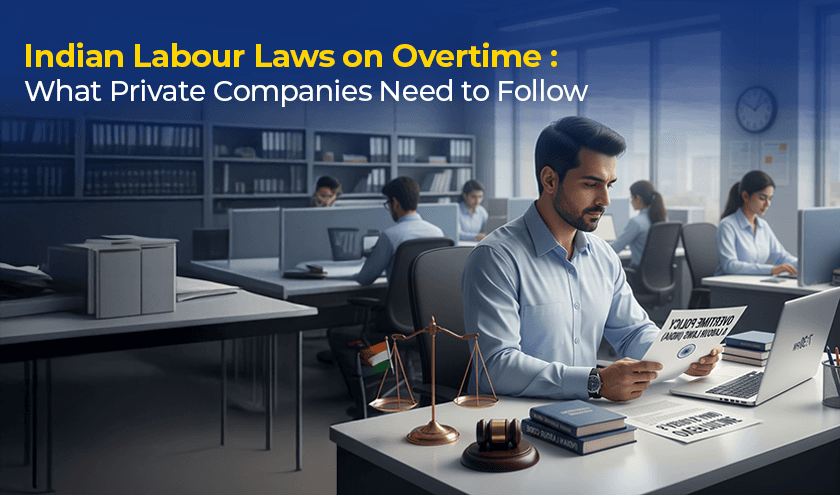Indian Labour Laws on Overtime: What Private Companies Need to Follow

Caught Off Guard by Overtime Rules? You're Not Alone.
Imagine this: your business is scaling fast, your employees are clocking in extra hours to meet deadlines—and suddenly, you’re slapped with a legal notice for violating overtime regulations. Sound familiar? Whether you're a growing startup or a well-established enterprise, navigating India's overtime laws can be surprisingly tricky.
In this blog, we'll walk you through everything private companies need to know about overtime laws in India—from legal limits to common pitfalls—backed by expert insights from trusted labour and employment lawyers in Delhi.
Understanding Indian Overtime Laws: Why This Matters
Overtime isn't just about paying employees a little extra for staying late—it’s a tightly regulated area of Indian labour law. Violating these laws can lead to legal penalties, reputational damage, and employee dissatisfaction.
In this post, you'll learn:
- The key Indian labour law overtime rules that apply to private companies
- The distinction between the Factories Act and the Shops and Establishments Act
- Common mistakes businesses make—and how to avoid them
- How expert labour lawyers in India can help you stay compliant
At VakeelSaab, we specialize in labour law compliance and offer online lawyer consultation for businesses and individuals seeking reliable legal guidance.
Legal Framework for Overtime in India
Primary Laws Governing Overtime
- The Factories Act, 1948
- Applicable to manufacturing units with 10+ workers (with power) or 20+ (without power)
- Defines working hours, rest intervals, and overtime rules
- Section 59: Employees working beyond 48 hours/week are entitled to twice the ordinary wage rate for overtime.
- Shops and Establishments Acts (State-specific)
- Applies to commercial establishments, IT companies, retail, etc.
- Working hours and overtime provisions vary by state
- Common rule: Work beyond 9 hours/day or 48 hours/week typically counts as overtime
- Minimum Wages Act, 1948
- Ensures that overtime pay does not fall below the statutory minimum wages
- Relevant for both blue-collar and low-income white-collar jobs
- Contract Labour (Regulation and Abolition) Act, 1970
- Overtime provisions apply to contract workers too, with employer responsibilities clearly defined
Featured Snippet Answer: Under Indian law, overtime work beyond 48 hours per week must be compensated at double the employee’s normal wage, as per Section 59 of the Factories Act, 1948.
Common Misconceptions and Mistakes Employers Make
Despite clear laws, many private companies fall into traps due to misinformation or oversight. Here are some common issues:
Misclassifying Employees
Assuming salaried staff or managers aren't entitled to overtime pay is a big mistake. Unless clearly exempt under law, all eligible workers must be compensated.
Ignoring State-Specific Laws
A company registered in Delhi must comply with Delhi Shops and Establishments Act, which may differ from Maharashtra’s provisions. Local compliance matters.
Lack of Documentation
Failure to maintain timesheets, attendance logs, and wage records can lead to penalties—even if overtime was actually paid.
Capping Pay Without Legal Basis
Setting a flat “comp-off” policy or denying pay for weekend work without proper authorization can violate statutory rights.
What You Should Do: A Legal Checklist for Employers
If you're an employer or HR manager in India, here’s what you need to ensure:
Know Which Law Applies to You
- Factories Act = Manufacturing Units
- Shops & Establishments = Offices, Retail, IT, Service Sector
Track Working Hours Accurately
Use biometric systems or software to log in/out times and generate reports.
Pay Double for Overtime
As per the law, overtime must be paid at twice the ordinary rate of wages.
Maintain Wage Registers
These should be readily available for audit or inspection by labour officers.
Stay Updated with Law Changes
Labour laws in India are undergoing reforms (e.g., new labour codes), so subscribe to updates or seek regular online lawyer consultation.
Real-World Scenarios: How Legal Advice Saved the Day
Case Study 1: IT Startup in Gurgaon
A tech startup approached VakeelSaab after receiving a labour department notice. The company was offering “comp-off” without any overtime pay. After a compliance audit and policy revamp guided by our Labour and Employment lawyers in Delhi, the issue was resolved without penalties.
Case Study 2: Factory in Pune
A manufacturing unit miscalculated overtime, paying 1.5x instead of 2x wages. A former worker filed a complaint, and VakeelSaab helped them settle through conciliation—preventing litigation and reputational damage.
Expert Tips for Best Practices
At VakeelSaab, our team of experienced labour lawyers suggests the following:
- Draft clear employment contracts with clauses on working hours & overtime
- Display legal posters with working hour rules in the workplace
- Review compensation policies annually with legal input
- Offer training for HR personnel on compliance protocols
- Consider an internal audit every 6–12 months
Want to stay ahead? Book a compliance health check with our legal team.
Frequently Asked Questions (FAQs)
Is overtime pay mandatory in India?
Yes. Under laws like the Factories Act, overtime pay at double the rate is mandatory for eligible employees.
Can companies offer comp-off instead of overtime pay?
Only if permitted under applicable law and with proper documentation. Otherwise, it can be challenged.
Are managers or senior staff eligible for overtime?
Depends on the nature of their job and employment contract. They may still be eligible if their work is not supervisory or managerial.
What are the penalties for non-compliance?
Fines, legal notices, and in some cases, imprisonment under labour law violations.
How can I ensure I'm compliant?
Consult a labour lawyer in India or book an online lawyer consultation with VakeelSaab for a compliance audit.
Related Articles
The Importance of Consulting a Property Lawyer for Real Estate Issues
Blog
How to File a POCSO Complaint in India: Step-by-Step Legal Process
Blog
What punishments does the law give for giving, taking, or asking for dowry?
Blog
Reasons for the Increasing Divorce Rates in India
Blog
What is a Special Leave Petition? Meaning, Features, Process & & Who Can File?
Blog
What Is the Difference Between Mutual Divorce and Contested Divorce?
Blog